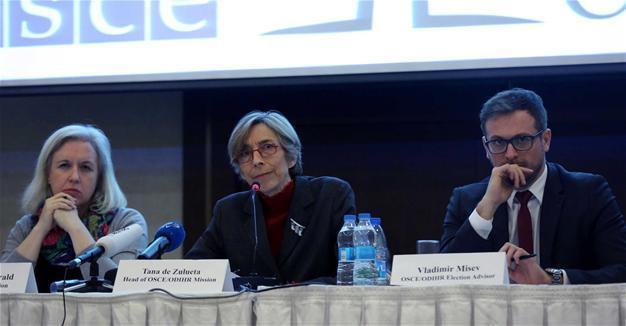OSCE delegation commences referendum observation mission
Sevil Erkuş - ANKARA
 The OSCE’s Office for Democratic Institutions and Human Rights (ODIHR) has launched a mission to observe the April 16 constitutional referendum in Turkey.
The OSCE’s Office for Democratic Institutions and Human Rights (ODIHR) has launched a mission to observe the April 16 constitutional referendum in Turkey.The mission will try to understand what all stakeholders can do in the campaign so that citizens can make an informed choice and are presented with opportunities that are available to them, Tana de Zulueta, the head of the OSCE/ODIHR limited referendum observation mission, told reporters on March 17 in response to a question about how Turkey is running the referendum under the current state of emergency.
Zulueta noted that very few of the recommendations made by previous observation missions were taken into account by the Turkish government. The delegation has yet to determine where it is going to work, but she stated that they would not be allowed in some places.
The mission will observe whether or not the referendum is in compliance with OSCE commitments, other international obligations and standards for democratic elections and referenda, as well as with the national legislation.
Zulueta said recommendations from the mission will be published eight weeks after the task is completed. “It is the country’s responsibility to fulfill these recommendations,” she said.
A core team of 11 staff from seven participant states located in Ankara, along with 24 long-term observers will be deployed all over the country. The mission, invited by the Turkish government, will meet representatives from state authorities, political parties, civil society, media and the international community.
The mission will visit a limited number of polling stations on the day of the referendum, however, systematic observation voting, counting or the tabulation of results on referendum day is not envisaged.
The OSCE has deployed limited election observation missions to Turkey in previous parliamentary elections. The Nov. 1, 2016 early parliamentary elections in Turkey offered voters a variety of choices, the mission said.
At the same time, the challenging security environment, particularly in the country’s southeastern provinces, coupled with a high number of violent incidents, including attacks against party members, premises and campaign staff, hindered contestants’ ability to campaign freely, the observers said after the elections.
















